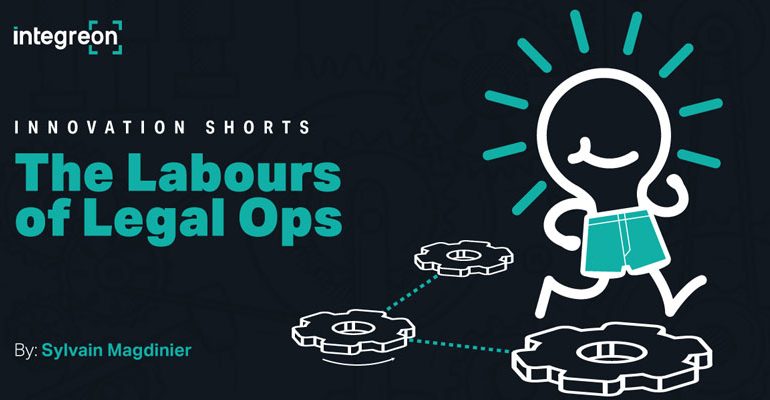This month we report from the engine room of innovation in the corporate legal function. You may need to sit down for this one. We are not talking about artificial intelligence, or contract lifecycle management systems. And forget about non-fungible tokens. We’re talking people. Actual human beings. And not just any human beings. This is about the tough, resourceful, multi-skilled folks who not only keep the lights on in the legal department, but help replace them with more efficient, money-saving LEDs1. This is about Legal Operations.
A big thank-you to Stephanie Corey for her contribution to this piece. Stephanie is a pioneering industry leader and adventurist in this field: co-founder of CLOC, co-founder of consultancy UpLevel Ops and arguably the Indiana Jones of Legal Operations, albeit with a fresher wardrobe.
The Labours of Legal Ops
We wanted to shine a light on the role that Legal Operations plays in corporate legal innovation. There is much chatter in our industry about what innovation consists of. This article is about how innovation happens, what gets in the way and how much more innovation we might see in legal functions if the wisdom of Legal Ops was widely dispersed.
A short conversation overheard at the legal department watercooler nicely summarizes the themes we are going to cover. The cast in this drama:
- Gary, a middle-ranking associate in a large corporate law department.
- Ruth, a manager in the Legal Operations team.
- Zod, the General Counsel.
Gary: I can’t take it anymore. Constant deal pressure, repetitive, low-value work. Now I’m working mostly from home, I’ve even had to buy my own Nespresso machine.
Ruth: I’m sorry to hear that, Gary. No, it’s fine, I have another handkerchief. Maybe we should take a look at the kind of work you are doing, the processes involved – see if we can restructure things a little?
Gary: What?!! We do the work this way because that’s how it’s always been done. It’s called precedent. How dare you question my legal knowledge.
Zod: Sup kids, how you doing? Listen, you should make an effort to join my town hall call later today. Change is in the air.
Gary: Awesome. We’re buying that Metaverse platform for avatar-based contract negotiations?
Zod: Er… no. I’ve just had my budget shaved closer than a Tour de France cyclist’s leg. I’m going to be doing some restructuring.
Gary: That’s funny, Ruth was just…
Ruth: No, Gary, that’s not what I had in mind.
What Legal Ops Have in Mind
Legal Operations provide the administrative support for a legal function. What that entails in practice can vary widely according to size, maturity, and industry focus of the legal department. But in broad terms the Ops team track and help to manage how the department:
- spends money on external counsel;
- deploys its budget on IT, communications and data management systems;
- staffs the legal team;
- hires, manages, and spends money on the various vendors who supply services to the department; and
- runs the administrative systems that underpin all this infrastructure.
If you think of a corporate legal department as a mini-business, Operations are a critical function in ensuring that the business is run efficiently and effectively. Legal Ops leaders want to be both tactical and strategic in carrying out their role, but they are often condemned to a life of firefighting in the long grass rather than helping the General Counsel plan for the horizon.
Back to our daytime mini-series for another illustration:
Gary (Looking at General Counsel Zod nervously): You mean… redundancies?
Zod (Trying to look sympathetic): I’ve got to make urgent and significant cost savings. You do the math.
Ruth: But there must be other savings we could make. We spend an awful lot on external counsel, for a start.
Zod (Panicking): You innocent fool. We can’t cut our outside counsel budget. Have you seen the lunches they take me to? I had no idea you could eat snails.
Ruth: There are cheaper support options for low-complexity work, you know. Managed service solutions from offshore teams…
Zod: Interesting. I hadn’t thought of outsourcing.
Gary (Panicking): No, wait. Our work is difficult, specialized. We can’t just ship off chunks of it to India or Missouri.
Zod: And yet, not five of your Earth minutes ago you were complaining about having too much low-value work to handle. Explain yourself.
Gary (Realizing he’s been cornered by a superior lawyer, reaches for the F-bomb): Force majeure.
Zod: What?
Gary: You remember that CrazyBank negotiation last month? We had a 4-day escalation on the force majeure clause. I mean, imagine the outcome if we hadn’t been all over that deal…
Zod (Realizing he’s been cornered by a superior lawyer, turns to Ruth):
Ruth: You can outsource basic activity and still have escalation paths for those exceptions, like when you need to have a force majeure Ultimate Fighting contest. We did that at the last company I worked for and saved a shed-load of money.
Zod (Stroking one handlebar of his moustache pensively): Interesting. Tell me more.
Eternal Damnation (and Where to Find the Exit)
We have all heard of the Innovator’s Dilemma. Clayton Christensen’s famous proposition observes that dominant market players can struggle to innovate when the innovation threatens their established, lucrative business model. Corporate legal departments face a second dilemma2. Many teams are overburdened with urgent client support requests, diverting them from strategic process improvements that might make life easier for both the lawyers and their clients. Every day their hair catches fire, but they are too busy hitting the sprinklers to work out how to stop the fires from starting in the first place.
To put this another way, you can’t change how things are done until you know how things are done. And it is the job of Legal Ops to know how things are done in a legal department – across processes, systems, and people. Yet in-house Ops teams are often caught in the same circle of hell as their legal colleagues: every day is a fire drill, simply keeping on top of operations and the current projects in flight.
But there is an exit sign, with one word above it: Assessment.
The Assessment
You can’t change how things are done until you know how things are done. And the devil is in the detail. In this case, the devil takes many forms: duplicated effort; manual process that could be fully or semi-automated; low-complexity work being handled by expensive, relatively sophisticated legal professionals; unnecessarily elaborate approval paths; excessively risk-averse contractual positions and process tools. And so on. An assessment is how a Legal Ops team – often supported by expert consultants who specialize in this activity – create an X-ray of departmental processes and tools so that the inefficiencies, sources of inertia and avoidable work burden can be revealed.
We return to our acclaimed legal drama…
(Zod is in a meeting with Ruth, to look at the results of a month-long operational assessment that a consultant has just completed for them.)
Zod (Scowling at the PowerPoint Ruth is presenting): But what does this mean, Ruth? I can’t share this with anyone! It looks like nobody’s in charge. (Zod laughs nervously.)
Ruth: You would be surprised how common this is.
Zod: Really?
Ruth: A lot of corporate legal departments have the same issues. Now we know where to find some efficiencies, we might not need to cut our headcount so drastically.
Zod (Opening his cigar box): Excellent. I rather liked Gary. He’s an expert on force majeure, you know. So, ah, what’s the plan?
Ruth: Right, well. The top issue highlighted in this assessment is the amount of repetitive, low-complexity work that the team are having to manage at the moment. It’s both the work they do – which includes matters like NDAs, basic statement of work reviews, standard procurement deals etc. – and the surrounding administrative processes – especially the record-keeping associated with the contract lifecycle management tool. This is damaging morale and reducing bandwidth, which also explains the high expenditure on external counsel during peak deal periods.
Zod (Mansplaining from behind a cloud of cigar smoke): Ah Ruth, Ruth. We send the more complex work to our outside counsel! It would make no sense to give them the NDAs and SOWs to look at. You must see that, surely?
Ruth (Gritting her teeth): But that’s the work that your team want to be handling. The big commercial deals are going to the law firm and your mid-level and senior attorneys want to be owning those deals.
Zod: But my dear girl, our people are too busy!
Ruth (Whispering a yoga mantra to herself): The plan would be to reduce the amount of work you send to outside counsel, reserving them for only the very biggest, complex, riskiest matters. Outsource the low-end work to a low-cost service provider, and free up your team to take over more of the higher-value matters from outside counsel.
Zod: This will save us money?
Ruth: And improve morale. And a lot more of the admin work can go to an outsource provider, too. All the stuff associated with the record-keeping, data hygiene, reporting etc.
Zod: OK. What’s that next bullet-point?
Ruth: You don’t have any visibility into the work coming into your department.
Zod: Nonsense. My VPs tell me everything.
Ruth: No, I mean you don’t have meaningful data on the work and its patterns.
Zod: Are you suggesting my VPs are not giving me the full picture? I’m like a father to them.
Ruth: No. I’m talking about capturing and being able to analyze the data methodically. You would automate work intake and a higher proportion of the workflow, capturing useful data along the way.
Zod: Automate, you say? We would instal robots?
Ruth: Software. It’s called robotic process automation and uses software applications that some people call bots.
Zod: But we could call them robots. It’s important. I want to win an award for legal innovation next year.
Ruth: Well, this plan can only help you get there. The project should not take more than 3 months to complete, given the workflows involved, so the great thing is that an intake tool and new process will give you a quick win to share with the department.
Zod: Me like quick wins. What will I be getting from this project, I mean apart from all that data you were going on about?
Ruth: The intake tool will centralize how support requests flow into the department, which will create more consistency and help with triaging. Requestors will see where their queries are in the queue, and we’ll be able to generate reports on matter status and key features.
Zod (Admiring his cigar and dreaming about an industry innovation award): Marvellous. When do we begin?
More Innovation Shorts to follow. Next time – The Big Event
1Metaphorically speaking.
2That’s 4 lemmas, if you will.


